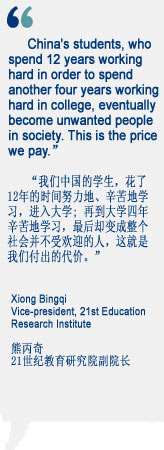Transcript·文字实录
冯欣:上期《解析中国》,我们采访了一些招工的雇主,探讨是什么让用人单位难以招到员工——特别是理想的员工。我们采访的专家说,中国产业结构和劳动力市场的变化、中国高校的扩招,以及用人单位和大学毕业生心理预期的不对等,都造成了用人单位的招工困境。然而从求职者的角度来看情况又是如何呢?官方数据显示中国现有的岗位空缺数实际上大于求职者的人数,为什么我们还经常听说大学毕业生就业难呢?在探讨这些问题之前,我想先请您随我一同去几个招聘会上看一看。
Feng Xin: In the last episode of Digest China, we asked a number of employers what makes it difficult for them to recruit workers, and more importantly, ideal workers. The experts we interviewed said the changes in China's economic structure and work force, the expansion of China's higher education and the dissymmetry in the expectation between employers and college graduates all contribute to employers' recruitment troubles. But what does the picture look like from a job seeker's point of view? While official statistics show China's available jobs actually outnumber job seekers, why do we often hear stories about college graduates unable to find jobs? Before getting into these questions, I'd like to take you to a couple of job fairs.
记者:您目前大概投递了多少份简历呢?
Reporter: How many resumes have you sent out so far?
受访者:二十多封吧。
Respondent: About 20.
受访者:大概四、五十份简历吧。
Respondent: About 40 or 50.
受访者:投递了——我自己都不知道了。
Respondent: I have sent – I don't know how many.
记者:这个工作和您的专业相关吗?
Reporter: Is the job you are applying for relevant to your major?
受访者:不相关。
Respondent: No.
受访者:不太多。反正我实习这半年期间做的是跟专业一点都不相关的。
Respondent: Not really. The internship I did in the past six months wasn't relevant to my major, anyway.
记者:那您现在找工作遇到的最大的困难是什么?或者说您找工作的感受(是什么)?
Reporter: What's your biggest difficulty in finding a job? Or how do you feel about your job search?
受访者:迷茫,越找越迷茫。都不知道定位了。
Respondent: More and more confused. I don't even know how to look at myself any more.
受访者:感受就是工作还是挺多的,不过符合自己要求的还是比较少的。
Respondent: I think there are many jobs out there, but few met my expectations.
受访者:就是有些具体的想法还没有想清楚,自己以后的发展还没有规划好。
Respondent: I haven't thought certain things through or made a plan for my personal development.
受访者:人家一般都要求有经验,另外现在很多单位并不缺人,比方说你想进比较好的企业,这种难度比较大,就是比较出名、人尽皆知的企业。
Respondent: Employers usually prefer those who have experiences. And a lot of companies don't have vacancies right now. It's quite difficult to get in a good company. By good companies, I mean those everybody knows.
受访者:我觉得那些企业应该给应届生一些机会。因为毕竟应届生经验比较少,只有从基层慢慢地培养才可以,但是有一些企业并不太想培养应届生。
Respondent: I think companies should give college graduates an opportunity. Since graduates don't have much experience, they need to start from the basics and learn gradually. But some companies aren't willing to train college graduates.
受访者:现在大概有50%以上的人都在跨专业择业,在跨专业之后,他们就有一个很茫然的状态,我现在就处于这种状态当中。造成这种现象的原因,我认为就是在高考的时候,他们选择专业的时候,就不知道自己喜欢什么,也不知道这个专业以后的前景是什么。
Respondent: More than 50 percent of job seekers nowadays choose jobs irrelevant to their majors. If they do that, they will feel very confused. I am in that kind of a mode right now. The reason behind this phenomenon, I think, is that when we were taking our college entrance exams and choosing majors, we didn't know what our passion was. Nor did we know the prospect of the majors we chose.
受访者:我觉得还是许多大学的教育跟现在社会的一些方面有点脱节。
Respondent: I think our higher education is somewhat out of line with the society.
记者:您在找工作过程中,有哪些素质是用人单位要求的,但是您认为自己本身却不具备的?
Reporter: While you are looking for a job, what are some of the qualities you find employers value but you are not equipped with?
受访者:现在不管你做什么,都需要有很强烈的团队精神,还有就是你的专业基本素质。
Respondent: Whatever you do, you need to have a strong team spirit, as well as some basic professional skills.
受访者:其实就是一个经验、熟练度呗。
Respondent: Level of experience.
受访者:应变能力啊,或者是自己的营销能力,口才这方面的(要求)应该会比较多。
Respondent: Adaptability and marketing skills. Also, speech skills.
受访者:就是亲和力,沟通能力特别强。
Respondent: People skills and strong communication skills.
记者:如果让您用一个词来形容找工作,您会用哪个词?
Reporter: Which word would you use to describe your job search?
受访者:茫然。
Respondent: Confused.
受访者:惊险。
Respondent: Thrilling.
受访者:杂、乱、多。
Respondent: Complex, chaotic and overwhelming.
受访者:任重而道远。
Respondent: Still a long way to go.
冯欣:对于刚离校的大学毕业生看来劳动力市场又是什么情况呢?中国政府也刚刚公布,2012年第二季度国内生产总值的增长速度下降到了7.6%, 为三年来的最低值。7月25日,我参加了人力资源和社会保障部召开的季度新闻发布会。
Feng Xin: How does China's job market look to graduates who just left college, given the fact that the Chinese government just announced the country's GDP growth slowed to a three-year low of 7.6 percent in the second quarter of 2012. On July 25, I attended the quarterly press conference held by the Ministry of Human Resources and Social Security.
尹成基:今年以来,正如你所说的,我国的经济按照宏观调控的预期,增速有所趋缓,在东部地区表现比较明显,城镇新增就业的增长有下降的趋势。但是,中西部地区,城镇就业的人数都保持了比较强劲的增长。
Yin Chengji: Starting this year, as you said, our economic growth has slowed down as the country's macro-control policy planned. This has affected East China regions in particular. The number of new jobs in cities tends to go down. But in Central and West China, new jobs are still growing steadily.
新闻发言人说,找工作的人在2012年下半年将会感到压力,因为大量的新增劳动力将涌入市场。第二,用人单位会对技术工人的需求将进一步增大,而劳动力市场又无法供应足够的技工。
The spokesperson said the second half of 2012 will be particularly stressful on job seekers, since a large number of new workers will flood into the job market. Secondly, employers will be seeking a growing number of skilled workers, of which there is a shortage.
2011年,用人单位共招聘人员近2070万次,有1960万人求职。也就是说,每100个求职者相对应的岗位是106个。2012年第一季度,这一比例上升至100比108,这些数据来自人力资源和社会保障部对全国100多个城市劳动市场的检测。80%的用人单位对求职者的文化程度有要求。大部分要求求职者有高中文化程度,在这38.5%中,有超过60%的用人单位要求中等职业技术学历。在所有对文化程度有要求的用人单位中,只有8.5%要求求职者有大学学历。
In 2011, China provided nearly 20.7 million jobs for 19.6 million job seekers. This means for every 100 candidates there were 106 jobs available. The ratio went up to 100:108 in the first quarter of 2012. These numbers come from the Ministry of Human Resources and Social Security's job market monitoring of about 100 Chinese cities.Eighty-eight percent of employers have specific education requirements for job candidates. Many require a high school education. Of that 38.5 percent, more than 60 percent require professional diplomas. Of employers who do have education requirements, only 8.5 percent require university diplomas or bachelor's degrees.
三月,一家独立研究机构,麦可思研究院,对中国2000多所大学的25万名大学毕业生进行了问卷调查。根据麦可思的研究报告,2011年,中国有600多万名大学毕业生,其中90.2%在毕业后6个月找到了工作。但是这家机构还发现,在已经找到工作的这些大学毕业生中,有14%的人从事着与自己专业不相关的职业,并处于当地月收入最低的25%的人群中。
In March, My China Occupational Skills, or MyCOS, an independent research institute, conducted a survey of more than 250,000 college graduates from more than 2,000 Chinese universities and colleges. According to MyCOS, China had 6 million college graduates in 2011, and 90.2 percent of them found jobs six months after they graduated. However, the institute estimates that 14 percent of these employed college graduates are working in fields irrelevant to their majors and in the bottom 25 percent in terms of income in their local regions.
麦可思将大专院校的专业分为红牌、黄牌和绿牌专业。红牌专业失业率最高,月收入最低而且就业满意度最低;绿牌专业的所有这些指标都是最佳的;黄牌专业居中。根据麦可思的排名,红牌专业包括很多热门的专业,如动画、法学、生物技术、生物科学与工程、英语以及国际经济与贸易等。黄牌专业包括计算机科学与技术、艺术、设计、工商管理和汉语言文学等。绿牌专业包括地质工程、石油工程、采矿工程、船舶与海洋工程以及审计学等。
MyCOS categorizes university and college majors into red, yellow and green signs. Red indicates majors that receive the highest unemployment rate, lowest wages and most dissatisfaction from employees. Green sign majors, however, indicate the best ones in terms of these criteria, and the yellow sign majors sit in the middle. According to MyCOS's ratings, red sign university majors include popular ones like animation, law, biotechnology, biological engineering, English and international economics and trade. The yellow sign category includes majors like computer science, art, design, business administration and Chinese language and literature. The green sign category, however, includes majors like geological engineering, petroleum engineering, mining engineering, naval architecture and ocean engineering and auditing.
这些分类向我们传达什么信息呢?我们采访了麦可思研究院的执行院长郭娇。
What can such categorization tell us? We talked to Guo Jiao, MyCOS' chief research officer.
冯欣:我们经常看到的一个现象是,一方面用人单位时常抱怨招不到理想中的人,招不到想要的人,而一方面求职的人又招不到这样的雇主,这个现象是怎么回事?是什么原因导致的?
Feng Xin: We often see the situation of employers having difficulties in finding people they want, while jobseekers can't find the employers (they want). How does this happen?
郭娇:这个现象其实归纳一下,我们常说的一种“不匹配”,就是你刚才说的这种,雇主他的需要和有求职期待和意愿的毕业生之间,他们出现了一种不匹配的现象。我觉得要从两个方面来看,一个方面就像我们刚才说到的那些绿牌专业,尤其是工程学,不是所有的高校都能够马上给学生提供这方面的培养过程,然后马上培养出这些行业所需要的人才,就是它不能补充这个缺口。另一个方面,这些毕业生,尤其是中国的毕业生,他在选择专业的时候,他在高中的时候,他选择的这个专业或学校可能是他的父母决定的,甚至是他的高中老师决定的,然后在进入大学之后,中国的高校有个特点,你转换专业,或者说你退学再去报考其他学校,这种的机会很少,而且成本也很高。所以这些学生的不匹配可能在他填高考志愿、进到大学以后就已经发生了。
Guo Jiao: This is what we often call a "mismatch." Like you said, it's a mismatch between employers' needs and college graduates' expectations. There are two sides of the story. One the one hand, take the green sign majors like engineering as an example. Not all universities can provide students with relevant training in a short time and turn them into the type of talent that industries need. Universities can't fill in the gap.On the other hand, those graduates, especially Chinese graduates, were made to choose certain majors when they were about to enter college. Their majors were possibly determined by their parents or even their high school teachers. When they do go to college – there is something special about China's higher education – if a student wants to switch majors or transfer to another college, the odds are very small, and it won't be cost-efficient. Therefore, the mismatch might have happened as early as they took the college entrance exam and first entered college.
现在这种情况下,半年内毕业生的离职情况这么高,那么高校在想,我真正准备毕业生是他们的第一份工作,还是他们三年、五年、十年以后真正适合他们个人发展愿景的这样一份工作?也可能是他们的最后一份工作。
Under such circumstances, when a large number of graduates quit their job within six months, universities should be thinking whether they should prepare graduates with their first jobs or the jobs students will have in three, five or 10 years – the jobs that really meet each individual's prospects. These jobs may also be their last jobs.
冯欣:那您的意见是什么呢?大学应该怎么考虑呢?
Feng Xin: What's your opinion? What should colleges consider?
郭娇:大学首先应该跟踪他们的毕业生,应该及时地收集他们的毕业生在应聘的过程中,甚至在毕业三年后、五年后究竟发展怎么样,他到底需要哪一方面的技能,在他进入职场后最需要提高,但是在学校期间却没有满足的一些基本的知识,核心的能力。
Guo Jiao: Colleges should track their graduates' job-searching processes as well as their career status three or five years after they have graduated. (Colleges should see) what essential skills graduates need but weren't equipped with at college.
如果劳动市场的需求与学生选择专业的不匹配是从进入高校第一天就存在的,那么从事与自己专业不相关的工作到底好不好?我们在演播室里电话采访了中国就业促进会的副会长陈宇。
If the mismatch between the job market's needs and students' choice of majors existed from the first day of college, is it a good idea to work in a field irrelevant to one's major after he or she graduates? We directed this question through a studio call to Chen Yu, who is the vice-chairman of the China Association for Employment Promotion.
陈宇:我不是很主张一定要和专业对口,反对学非所用。实际上学校是一种综合技能的训练,学校里面学的一些专业知识,如果到你的工作岗位上正好能用上那更好,不能用上,它其实对你也有帮助。实际上你在学校里面更需要掌握的是一些通用的能力,我们把这种能力叫“核心能力”。比如说,与人交流、沟通、表达自己,实际上职场上最难的事情就是交流、沟通、表达;成本非常高;企业内存在的问题也是这样。你看交流表达、解决问题、自我提高、团队合作,这些东西实际上比你在大学里学的某一些专业课程可能更重要。
Chen Yu: I don't necessarily think you have to work in fields relevant to your major. In fact, universities provide a sort of general training. It would be ideal if you could use some of what you learned in your major after you found your job. Even if you can't, your knowledge can still be helpful in some ways. In fact, it's more important to grasp some transferrable skills at college, which we call "core skills," like communicating with people and expressing oneself. Indeed, the most challenging task at the workplace is communication. The cost of doing so is very high. It applies to companies, as well. Communication, problem-solving, self-enrichment and teamwork – these skills are perhaps even more important than some specific curriculum.
如果通用能力,比如沟通与问题解决有时比学生在高校里学到的专业知识还重要,那么高等教育的目的又是什么?我们就这个问题电话采访了21世纪教育研究院的副院长熊丙奇。他曾出版过多部关于中国高等教育的著作。
If transferrable skills such as communication and problem-solving are sometimes even more important than academic knowledge students learn at college, then what is the purpose of higher education? We directed our questions to Xiong Bingqi, the vice-president at the 21 Century Education Research Institute. He's written a number of books on China's higher education.
熊丙奇:教育分为精英教育和通俗教育,还有就是职业教育。进行通俗教育的学校,基本上是淡化专业界线,然后培养的学生的基础能力和基础素质。这些学生不是按照他(们)的专业就业是很正常的。我觉得随着社会的发展,越来越多的学生可能会专业不对口就业。那么在这种情况下,专业其实只是培养学生能力的载体,所谓的“教育是不是浪费了,人才是不是浪费了”,如果仅仅是以专业和就业的对口来评价,这样的观念已经都过时了。
Xiong Bingqi: There are three types of education: elite education, mass education and vocational education. At universities offering mass education, the boundaries between majors are mild. They mainly focus on developing students' basic skills and qualities. It's quite normal for these students to choose jobs irrelevant to their majors. I think as society develops, more and more students will choose jobs irrelevant to their majors. Under such circumstances, majors, in fact, are merely platforms where students can be trained. If you evaluate the efficiency of education only based on the degree of match between majors and jobs, you are quite outdated.
冯欣:那您刚刚提到一个词,“精英教育”,什么是精英教育呢?
Feng Xin: You just mentioned "elite education". What kind of education is that?
熊丙奇:这种精英教育不是培养所谓的精英的,它实际上就是进行通俗教育,关注的其实是学生基础能力、基础素养教育的这样一些学校。那么现在这些学校被认为是好学校,集中了优质教育资源的这些学校。因此我们现在就形成单一的链条,从好小学到好初中到好高中,再到好的大学,最后到好的工作,那这样的话,只有这种成才模式是被社会认可的。
Xiong Bingqi: Elite education is not to cultivate the so-called "elites". Elite education is indeed mass education, which focuses on developing students' basic skills and qualities. Now these schools are considered good universities, because they concentrate high-quality education resources. Therefore, we now have formed a singular chain: Students have to attend good elementary schools, good secondary schools, good high schools, good colleges, and (will eventually get) good jobs. Only such a chain of personal development is recognized by the society.
冯欣:您刚才提到通俗教育、职业教育、精英教育,那我有一个问题,我们大学教育的任务到底应该是什么呢?
Feng Xin: You just mentioned we have mass education, vocational education and elite education. Then, my question is: What exactly is the purpose of higher education?
熊丙奇:它实际上就是满足不同的价值层面的需求,总体来说就是(使)每个个体更加完善。所以说如果我们只重视了高等教育一方面的价值,就是它的就业的价值,或者功利的价值,那么这样就会使得高等教育整体的大学精神可能就会堕落,最后的结果就是整个社会会陷入非常功利的环境之中。
Xiong Bingqi: In fact, it is to fulfill different needs and values. That is to say, to help every individual become complete. If we only focus on one of the values higher education offers – that of finding jobs or its utilitarian value – the spirit of higher education will be corrupted. As a result, the whole society will be dragged into a very utilitarian environment.
冯欣:熊博士,我们采访的一些大学生告诉我们,他们求职时感到很迷茫,说不知道自己能做什么、想做什么,您认为造成的大学生这种迷茫的原因是什么呢?
Feng Xin: Dr Xiong, some college graduates we interviewed told us they felt very confused when looking for jobs. They had no idea what they can do or want to do. What factors do you think have contributed to their confusion?
熊丙奇:我觉得这跟我们整个中国的教育体系和社会环境是有关系的。因为在基础教育阶段,我们很多的学生,他们实际上是被父母、被老师包办代替,他们是“被规划”“被管理”,没有自主规划、自我管理的能力和意识。甚至到了大学,这种教育也是蜻蜓点水的。我们国家教育部曾经发文要求,所有大学都必须开设大学生职业生涯规划课,但是现在真正开设这个课程的学校还是很少,很多学校对学生的职业生涯规划就是一两次讲座,往往就是宣讲一些政策。那么这段时间学生对自己的个性的分析、能力的分析,对自己职业的定位,都不清楚。
Xiong Bingqi: I think it has to do with China's entire education system and social environment. During the phase of basic education, a lot of students are taken care of by their parents and teachers in terms of everything. They are planned and managed. They rarely have the ability and sense of self-planning and self-management. Even when they go to college, this kind of education is still just scratching the surface. The Ministry of Education has formally required all universities to offer career-planning courses, but very few universities have really done that. In many schools, career planning means only one or two lectures about some policies. During university years, students can hardly analyze their personalities, skills or career prospective.
所以有些学生(对于)现在要在中学进行职业生涯规划教育,(这个)很好,但是觉得也没有意义。我学了职业生涯规划课程,我懂得了生涯规划的重要性,但是回到现实中我没办法去规划自己。我想选择我喜欢、感兴趣的课程,你学校提供吗?或者说,我敢选吗?因此,没有这个选择空间,就谈不上这个选择能力的问题。所以说我们一直是计划体制下成长出来的,然后到了就业的时候全都是市场机制了,这个时候你要选择了,所以说学生就不知道怎么选择了。这样的结果是什么?就是我们中国的学生,花了12年的时间努力地、辛苦地学习,进入大学,再到大学四年辛苦地努力学习,最后变成整个社会并不受欢迎的人,这就是我们付出的代价。
Some students think it's good to have career-planning education at high schools, but this is meaningless at the same time. I took career-planning courses, I learned the importance of career planning, but in reality I can't plan my future. I want to choose courses that interest me, but do schools offer them to me? Or, do I really dare to choose those courses? They don't even have any room for choices, let alone the ability to choose. We grew up in a "planned system". But when we are out finding jobs, it turns into a "market system". It's time to make choices, but students don't know how. What's the consequence? The consequence is China's students, who spend 12 years working hard in order to spend another four years working hard in college, eventually become unwanted people in the society. This is the price we pay.
Archive · 往期

What makes it difficult for graduates to find jobs?
大学生就业难,难在哪?
Why do we often hear stories about college graduates unable to find jobs? -- 为什么我们经常听到毕业生找不到工作的事?
Does China have enough jobs for college graduates?招工难,难在哪?
What makes it difficult for employers to recruit enough workers? And what makes it difficult for job seekers to find such employers? 是什么造成了用人单位的“招工难”?又是什么让求职者难以找到这些雇主?
Does China have enough money to fund its pensioners?
中国有没有足够的养老钱?
How much money can we receive after we retire? At what age should we start planning our retirement? 退休后我们到底能领多少钱?到什么年龄应该计划养老问题?
Should Chinese people retire later?
中国人是否应该晚退休?
In what social context is the government’s proposal to push back China's retirement age rooted? 6月5日,人力资源和社会保障部提出,未来会逐步将退休年龄推迟五年。这样做有什么深层的社会原因?
Illegal immigrants: China's rise as a land of opportunity?
“三非”外国人:中国成为机会之地?
Is the increase of incidents involving illegal immigrants a symbol of China's rise as a land of opportunity? -- "三非"外国人日益增多,是否意味着中国成为机会的土壤?
Legislating domestic violence in China: Concepts - 中国反家庭暴力立法:概念
Digest China explores the concept of domestic violence and the difficulty in proving it. 本期探讨“家庭暴力”这个概念的本身和取证的困难。
Legislating domestic violence in China: Obstacles - 中国反家庭暴力立法:难点
Digest China explores some decade-long obstacles and difficulties in the process. 本期《解析中国》探讨中国反家庭暴力立法进程中长期存在的阻力和分歧。Topic · 本期话题
In the most recent episode of Digest China, we asked a number of employers what makes it difficult for them to recruit workers, and more importantly, ideal workers. The experts we interviewed said, the changes in China's economic structure and work force, the expansion of China's higher education and the dissymmetry in expectations between employers and college graduates all contribute to employers' recruitment troubles. But what does the picture look like from a job seeker's point of view? While official statistics show China's available jobs actually outnumber job seekers, why do we often hear stories about college graduates unable to find jobs? Find out in our newest episode.
上期《解析中国》,我们采访了一些招工的雇主,探讨是什么让用人单位难以招到员工——特别是理想的员工。我们采访的专家说,中国产业结构和劳动力市场的变化、中国高校的扩招,以及用人单位和大学毕业生心理预期的不对等,都造成了用人单位的招工困境。然而从求职者的角度来看情况又是如何呢?虽然官方数据显示中国现有的岗位空缺数实际上大于求职者的人数,为什么我们还经常听说大学毕业生就业难呢?
Poll · 投票
Guest profile · 嘉宾
The host · 主持人
无论在英国、美国还是中国做记者,冯欣对新闻的热情始终如她第一天跨入这个行业时那么高。更多内容>>>








